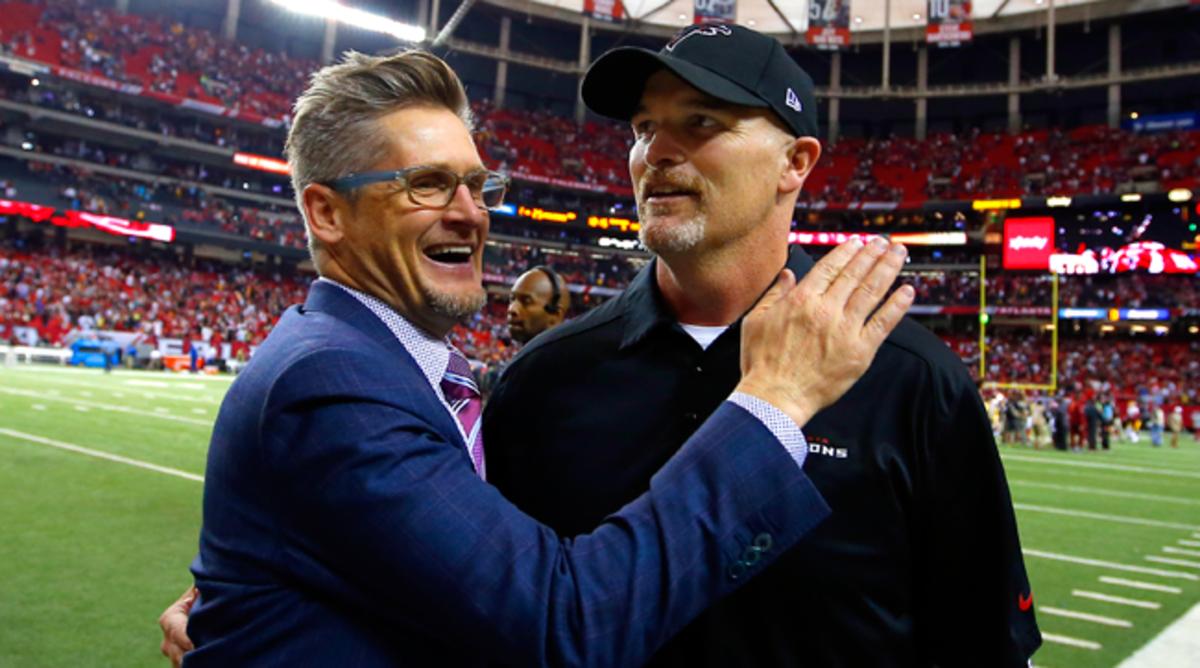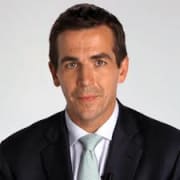The Shared Vision That Saved the Atlanta Falcons

HOUSTON — Thomas Dimitroff’s awakening happened at the end of the 2006 season, when the Patriots beat the Chargers in the divisional round of the playoffs. Dimitroff, now the Falcons GM, was at the time New England’s college scouting director. By most measures San Diego had more talent and was the better team, having gone 14-2 despite resting its starters in Week 17.
Yet the Patriots won. And they won because, across the board, they had it together.
The Chargers didn’t. They had a talented GM (AJ Smith) and a decorated coach (Marty Schottenheimer) who couldn’t get along, and the team imploded. The coach was gone less than a month later. San Diego’s spectacular, precocious core never won a title.
Lesson learned: If the most important relationship in the building isn’t taken care of—and if the coaching and scouting philosophies aren’t aligned—you don’t stand much of a chance in the NFL, no matter how many great players you have on the roster.
Lesson applied: Dimitroff, the GM in Atlanta since 2008, was forced to work with new coach Dan Quinn at the start of 2015—a move that took away some of Dimitroff’s roster control. But the GM subjugated his ego, forged a relationship with Quinn and helped get the Falcons back to the Super Bowl for the first time since the 1999 season.
Were there trust issues? Did he feel undercut? Was the outside noise about his job security too much to handle?
• SUPER BOWL 51: The Falcons Should Attack Brady by Holding Back
“When those things crept into my mind or started to tug at my attention, I just … I was very determined to pull it back and focus on that really strong definitive goal to build that relationship and build the team,” Dimitroff said in a quiet moment on Tuesday. “The reality is, we all know we’re going to deal with critics. I knew what I signed up for many years ago.
“I knew about the proverbial hot seat, I didn’t know if it was going be only one year or three years. I probably didn’t expect that. I understand it. And I appreciate Arthur [Blank] sticking by me during those tough times.”
It sounds so easy, doesn’t it? Find a good coach and a good GM, come up with a vision, align coaching and scouting, and win a whole bunch of games.
Ask the Colts about that. Or the 49ers. Or the Bills. Or the Rams.

Just like it’s a game for big people, pro football is also a game for outsized egos. And if there’s one common cause of internal chaos among NFL franchises, it’s egos clashing at the highest levels of football operations. The fallout is predictable. The coaches complain that players acquired by others don’t fit. The scouts, wanting to cover themselves, counter by collecting talent without regard to scheme. A mess follows.
This is the story of how it doesn’t have to be like that, and how the Falcons busted their asses to make sure it wouldn’t be like that when they made the decision to fire Mike Smith, retain Dimitroff and hire Quinn two years ago—a move that followed a 4-12 finish in 2013 and a 6-10 finish in ’14.
• TIM ROHAN: Arthur Blank’s Fixer-Upper
“It’s important that we hold each other accountable, that we’re holding up our end of the deal,” Quinn said. “Fortunate for us, we’ve seen some great models, not just in our own game, but also in basketball and baseball. It’s something we strive to keep moving forward. It doesn’t happen overnight, but he and I together, we work to keep growing stronger and stronger.”
Quinn saw Pete Carroll and John Schneider make it work in Seattle, and Dimitroff had a good view of how Bill Belichick and Scott Pioli (now the assistant GM in Atlanta) set up a dynasty in Foxborough. They’ve tapped their relationships with R.C. Buford and Greg Popovich (Spurs), and Bob Myers and Steve Kerr (Warriors) in the NBA, and Theo Epstein and Joe Maddon (Cubs) in MLB. But they’ve also done their own work.
• MATT RYAN: Atlanta’s QB Is Old School
As team president Rich McKay explains it, Quinn’s second interview, in 2015, was used as a relationship-building exercise between the coach-to-be and the GM, with the two working out how everything would be structured. Four months later, over a six-week period, Quinn and Dimitroff worked with a consultant, Mike Forde, on what’s called “corporate knowledge capture”—and they came out with mission statements on everything from team culture to athletic performance to coaching style and scouting structure. The idea was to have a singular vision.
“What blows up eventually, in my mind, is the word trust,” McKay says. “It’s the idea that somehow you begin to think that somebody else has a different agenda, that they’re not looking out for the same thing. And I think in many instances that comes from a lack of communication, and it winds up going to trust—and personnel winds up going to one side of the hall, coaching ends up on the other side of the hall, and it’s all bad … because then decisions are made for all the wrong reasons.”
• DAN QUINN: From William & Mary to the Super Bowl
After Dimitroff survived the 2015 purge, there was league-wide speculation that the Falcons would pair a new personnel man with their new coach in 2016; Seattle’s Trent Kirchner and Minnesota’s George Paton were even bandied about as candidates.
Dimitroff concedes now that his efforts to block out those reports were less than successful. He couldn’t avoid hearing it. “There were polls being run in the AJC that, two years in a row, were attempting to stir a lot up and suggest I shouldn’t be here,” he says. “I’d steer clear of it as much as possible. But there’s always going to be family and friends and loved ones calling: Did you see they wrote this about you?”
The results have spoken for themselves.
Offensive coordinator Kyle Shanahan inherited an offense that had cornerstones, and Dimitroff and Pioli added a center (Alex Mack), a game-breaker wideout (Taylor Gabriel), a reliable target (Mohammed Sanu), a pass-catching tight end (Austin Hooper) and a back (Tevin Coleman) to push the group and max out the scheme.
On defense, Keanu Neal—Atlanta’s version of what Quinn had in Seattle with Kam Chancellor—is as good an example as any of the collective vision coming together. But finding a pass rusher (Vic Beasley) and linebackers who can cover ground (Deion Jones, De’Vondre Campbell) was just as important to creating a unit built for short- and long-term success (seven first- or second-year players are starting).
Dimitroff explains why this has worked so well: “To me, it’s two very adept football men coming together, who are very confident, who are very secure, and who have an element of humility about them. And they understand they’re going to grow and learn together. I know that’s a long-winded way of saying it, but that’s what I believe. There were a number of things that were lined up, that’s why I think it worked.”
He and Quinn did the work to make sure they wouldn’t fall victim to what Dimitroff witnessed 10 years ago in San Diego. And so it makes sense that, with a team similarly stocked in potential, they’ve avoided a similar fate.
• Question? Comment? Story idea? Let us know at talkback@themmqb.com
